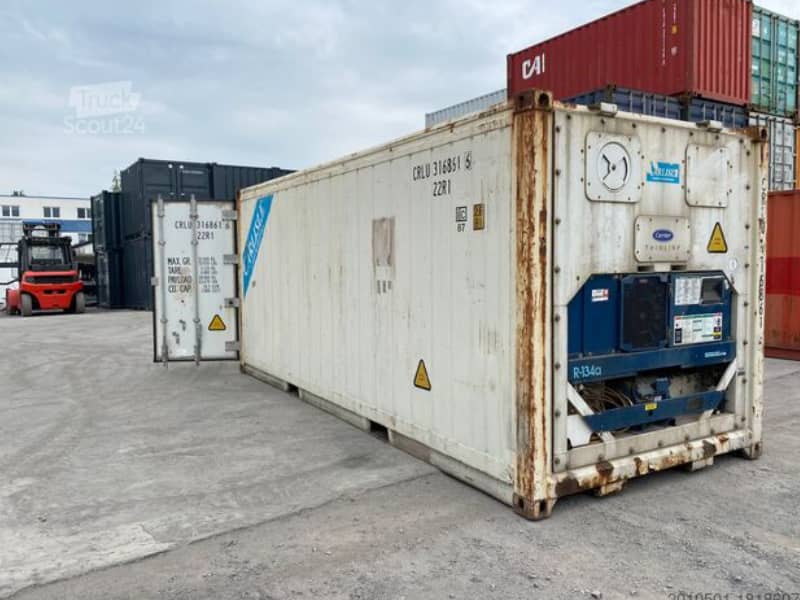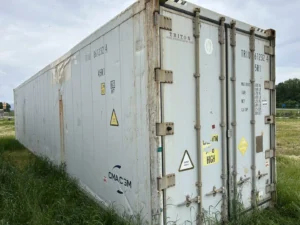Used 40ft refrigerated containers are reliable for commercial use
Everything About Cold Store Containers: Essential Insights for Your Storage Space Needs
Freezer containers play a crucial role in the conservation of disposable items. They can be found in numerous forms, consisting of refrigerated and shielded units, each designed for specific storage space requirements. Recognizing the benefits and key attributes of these containers is essential for services intending to enhance their procedures. As the demand for efficient storage space solutions grows, discovering the different choices offered can cause informed decisions that impact both success and sustainability. What elements should one take into consideration when selecting the ideal container?
Kinds Of Cold Storage Containers
Cold store containers been available in different kinds, each made to fulfill details temperature level control needs. Among one of the most usual kinds are cooled containers, which keep temperature levels in between 0 ° C to 10 ° C, making them appropriate for disposable products like fruits, vegetables, and milk products. Another kind is the deep freezer container, which operates at temperatures below -18 ° C, suitable for long-term storage of icy products such as meats and seafood.
Insulated containers provide temperature security without active cooling, making them useful for temporary transportation of temperature-sensitive items. In addition, there are portable cold storage space devices, which supply versatility in places and are frequently used in occasions or seasonal procedures. Ultimately, blast refrigerators quickly lower the temperature of warm foods, making certain safety and top quality. Each type serves an unique function in various industries, from food solution to pharmaceuticals, stressing the significance of picking the appropriate container for certain storage needs.

Benefits of Using Freezer Solutions

Cold storage space services extend the shelf life of items, decreasing waste and raising earnings for organizations. By effectively managing stock with appropriate temperature control, firms can enhance their supply chains and boost operational efficiency.
In addition, chilly storage space centers permit adaptable storage space options, suiting numerous volume requirements and seasonal changes popular (used 40ft refrigerated shipping containers). This versatility assists services react swiftly to market modifications
Using chilly storage space options can assure compliance with health and wellness and safety and security policies, protecting both businesses and consumers. On the whole, the critical use of cold store boosts item monitoring while advertising sustainability and economic stability.
Key Functions to Try To Find in Freezer Containers
When selecting cold storage containers, a number of key attributes merit careful consideration to secure peak efficiency and integrity. Temperature control capabilities are necessary; containers should maintain constant temperatures appropriate for certain goods. Insulation top quality additionally plays a significant function, as premium insulation minimizes energy usage and enhances temperature security.
Next off, simplicity of gain access to and loading is essential; containers should provide easy to use layouts for reliable handling and organization. Resilience is an additional essential aspect; weather-resistant materials guarantee longevity and guard contents versus ecological variables.
Furthermore, mobility features, such as integrated wheels or raising points, facilitate transportation, while customizable designs enable customized storage space solutions.
Monitoring systems, including temperature level alarms and remote tracking, supply real-time updates, making particular that conditions stay ideal. By focusing on these functions, customers can choose freezer containers that fulfill their functional demands efficiently.
Selecting the Right Cold Store Container for Your Demands
Choosing the ideal freezer container requires a thoughtful analysis of operational demands and certain demands. Factors such as the sort of items being stored, temperature sensitivity, and quantity needs to be focused on. As an example, subject to spoiling food items may demand containers with rigorous temperature level controls, while pharmaceuticals may need accurate problems to maintain efficacy.
Additionally, possible individuals must think about the container's size and movement. A bigger system may be essential for mass storage space, while smaller, portable choices might be optimal for short-lived or on-site needs. Insulation quality and power effectiveness are also important, as these will influence operational prices and temperature level security.
Compliance with sector guidelines and requirements is essential, particularly in markets like food and health care. By very carefully assessing these elements, users can pick a chilly storage container that effectively fulfills their distinct demands and assurances optimum storage space conditions.
Ideal Practices for Maintaining Cold Storage Space Issues
Maintaining optimal cool storage conditions is crucial for maintaining the top quality and safety and security of temperature-sensitive products. Frequently keeping an eye on temperature and moisture levels is critical; making use of trusted digital thermostats and hygrometers can offer precise analyses. Furthermore, proper insulation of chilly storage space containers assists decrease temperature level fluctuations and energy loss.
Applying a first-in, first-out (FIFO) system assures that older supply is made use of prior to newer stock, lowering waste (used 40ft refrigerated shipping containers). In addition, keeping an arranged layout within the storage room enables much better air flow and reduces the risk of cross-contamination
Regular upkeep examine tools, such as seals and compressors, are very important to stop breakdowns. Personnel training on finest practices for packing and unloading items aids keep temperature integrity. Ultimately, maintaining doors shut as much as feasible restrictions warmth exchange, assuring that the cool storage space atmosphere remains steady and efficient in protecting beneficial products.
Cost Considerations for Cold Store Solutions
When examining cold store options, it is necessary to take into account the preliminary investment expenses together with ongoing operational expenditures. A detailed malfunction of these costs can expose substantial lasting cost savings potential for services. Recognizing these economic elements helps stakeholders make notified decisions regarding their freezer requirements.

Initial Financial Investment Expenses
The economic landscape of cold store containers provides numerous initial investment expenses that organizations must consider. These prices commonly consist of the acquisition or rental rate of the containers, which can differ based on insulation, type, and size high quality. In addition, expenditures connected to retrofitting existing frameworks to suit freezer has to be factored in, particularly if specialized tools is needed. Installation prices, including electrical job and refrigeration systems, likewise add to the general preliminary financial investment. Services should not ignore transportation expenses for delivering containers to their wanted area. Lastly, potential modification options, such as shelving or temperature level surveillance systems, can even more affect the first financial investment. Mindful budgeting for these variables is crucial for successful cold storage execution.
Operational Expenditures Failure
Operational expenses for chilly storage space services incorporate several critical price factors to consider that companies should navigate. Trick variables include power costs, which can be significant due to the demand to keep reduced temperatures. Maintenance expenditures are also considerable, as regular maintenance is vital to guarantee devices runs efficiently and continues to be compliant with health and wellness criteria. Furthermore, labor expenses might emerge from the requirement click here for specialized personnel to check the storage space and manage environment. Insurance coverage expenditures are one more factor to consider, as companies must safeguard their investments versus prospective losses. Ultimately, any prospective regulatory conformity expenses need to be factored in, as organizations might require to purchase systems that follow food security and ecological regulations. Recognizing these expenses is essential for efficient budgeting.
Long-Term Financial Savings Prospective
Purchasing cold store services uses considerable long-term cost savings capacity, transforming initial expenses into economic effectiveness in time. By reducing spoilage and waste, services can boost their profit margins significantly. Advanced insulation and energy-efficient systems minimize energy costs, which build up over the life expectancy of the tools. Cool storage containers commonly require much less frequent upkeep compared to traditional refrigeration methods, leading to lower fixing expenses. The capacity to store products for extensive periods without compromising high quality allows companies to maximize market changes, optimizing profits. Additionally, the scalability of freezer services enables companies to adapt to transforming demands without sustaining extreme costs. In general, these elements contribute to an engaging case for cold store as an economical investment approach.
Frequently Asked Questions
The Length Of Time Can Food Be Stored in Cold Storage Space Containers?
The duration food can be kept in cool storage space containers varies by type. Usually, disposable products last from days to weeks, while frozen foods can continue to be risk-free for months, depending upon proper temperature and storage conditions.
Are Cold Store Containers Energy-saving?
The energy effectiveness of cool storage space containers differs based upon design and insulation top quality. Modern systems typically use advanced technology to decrease energy usage, eventually contributing to lowered functional costs and environmental impact in long-term use.
Can Cold Store Containers Be Personalized for Details Demands?
Freezer containers can indeed be personalized to meet certain demands. Alterations may include temperature controls, size changes, and extra features, permitting customers to tailor solutions properly for different storage needs and functional preferences.
What Are the Typical Dimensions of Cold Store Containers?
Cold storage space containers generally can be found in conventional dimensions such as 10, 20, and 40 feet. These dimensions fit different storage space needs, making certain versatility for companies needing temperature-controlled atmospheres for perishable items or delicate products.
Do Freezer Containers Require Special Licenses for Usage?
Cold store containers frequently call for special permits for usage, depending on local regulations and meant applications. Authorities may mandate licenses to guarantee security criteria, environmental conformity, and correct functional techniques are maintained during their utilization.
Cold storage space containers come in various types, each designed to fulfill details temperature control needs. Furthermore, chilly storage facilities allow for versatile storage space options, fitting different quantity demands and seasonal fluctuations in demand. Picking the ideal cold storage space container needs a thoughtful analysis of functional requirements and certain needs. The financial landscape of cold storage space containers provides different initial investment expenses that services need to take into consideration. Cold storage containers can undoubtedly be tailored to satisfy particular needs.